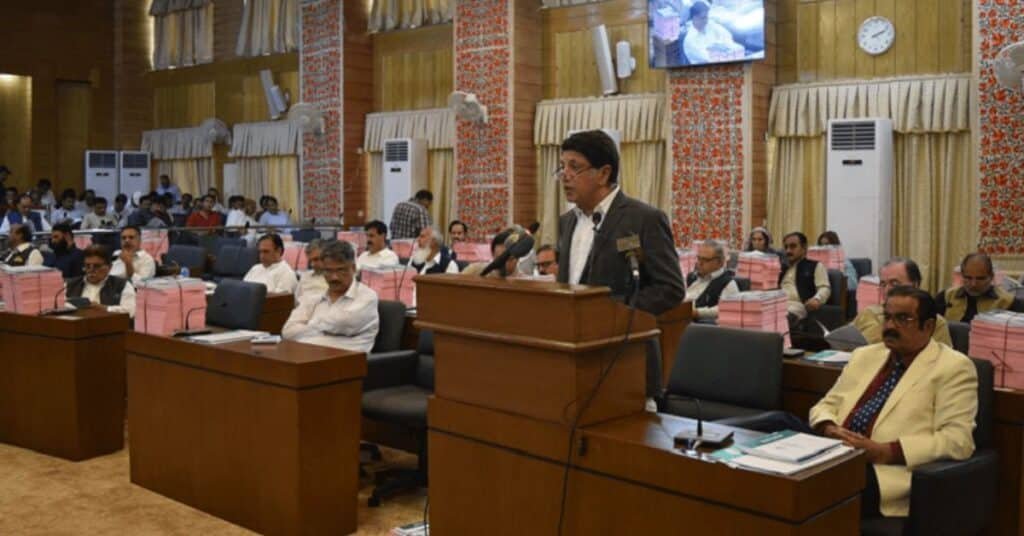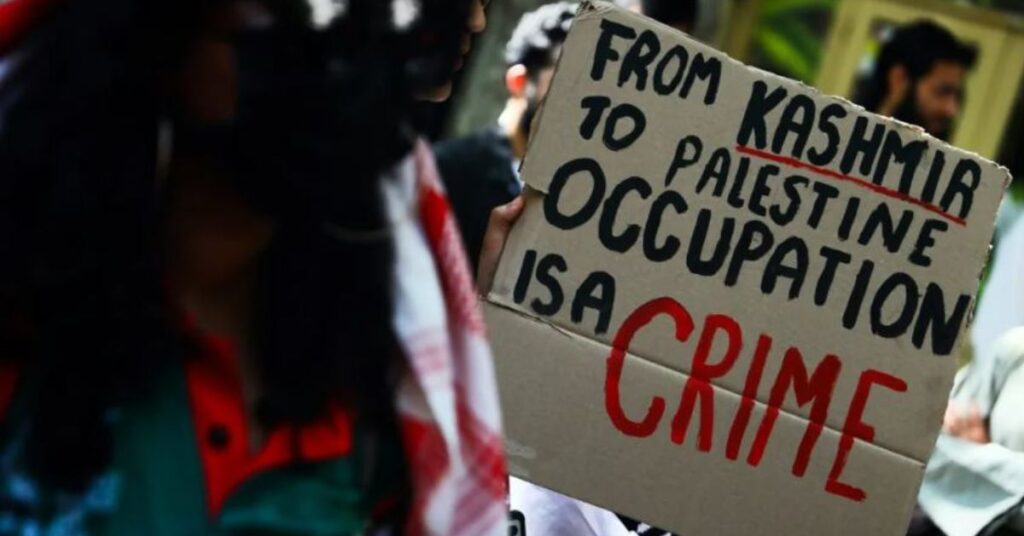By: Zulfiqar Ali (Kashmir Investigation Team)
MUZAFFARABAD: A debate has once again erupted on the controversial amendment criminalising criticism of the political and administrative elite in Azad Kashmir and making it a punishable offense.
The Pakistan Federation of Journalists (PFUJ), the organization of journalists in Pakistan, has demanded that the law be repealed. PFUJ President Afzal Butt argued that such a law is unconstitutional as it restricts freedom of expression, freedom of the press, and civil liberties.
Addressing a protest rally in Muzaffarabad on Wednesday, PFUJ President Afzal Butt said, “Any law that restricts freedom of expression, freedom of the press and civil liberties is inconsistent with the Constitution because the Constitution protects free expression and civil liberties.”
In September 2024, the Azad Kashmir Legislative Assembly passed a controversial amendment to Section 505 of the Penal Code of 1860, making public criticism of government officials a punishable offense.
After the legislation, the criticism of the President, Prime Minister, Ministers, MLAs, officers, and government institutions of AJK was declared a crime, and the critic could be sentenced to seven years in prison and a fine.
After the end of British rule in the subcontinent, not only India and Pakistan adopted this law, but Azad Kashmir also adopted it.
After 164 years, this law was amended for the first time, and this amendment was made by the coalition government of Azad Kashmir to protect the political and administrative elite from criticism.
What is Section 505 of the Azad Panel Code, 1860?
1: Whoever issues or publishes any statement, rumour, or report;
(a) With the intention or likelihood of inciting or inciting any officer, soldier, sailor, or airman of the army, navy, or air force of Pakistan to mutiny or to neglect or neglect his duty in that capacity;
(b) With the intention or likelihood of inciting or causing fear or panic among the public or any section of the public by which any person may be induced to commit an offence against the State or the public nuisance;
(c) With the intention or likelihood of inciting any class (community) or group to commit an offence against any other class or group, shall be punishable with imprisonment for a term which may extend to seven years and with a fine.
2: Whoever, with the intention of inciting any statement or report which is based on rumour or sensational news, promotes feelings of enmity, hatred or enmity between different religions, races, linguistic or regional groups or castes on grounds of religion, race, place of birth, residence, language, caste or group or on any other ground, shall be punishable with imprisonment for a term which may extend to seven years and with fine.
What has been amended in this Act?
Section 505 has been amended to include the existing “Explanations” as Explanation-1, which states that it is not an offence within the meaning of this section if the person making, publishing or disseminating such statement, rumour or report has reasonable grounds to believe that the statement is based on fact and has issued or published it in good faith, and has disseminated it without any of the above intentions.
A new Explanation-11 has been added, in which the “community” includes the President, Prime Minister, Ministers, and Members of the Assembly, as well as government institutions and government officers, which means that criticizing them has become an offence.
The coalition government in Azad Kashmir includes the Pakistan Tehreek-e-Insaf (PTI), Forward Block led by Prime Minister Chaudhry Anwarul Haq, Pakistan Muslim League (PML-N) led by Nawaz Sharif, and Pakistan Peoples Party (PPP) led by Bilawal Bhutto Zardari.
Although Imran Khan’s PTI is the opposition party in the assembly, and the PML-N, PPP, and PTI—despite being historical rivals—all these parties united to amend the law.
Section 505 was enacted in the subcontinent by the British Empire in 1860. That is why it is called the Indian Penal Code 1860.
When this section was enacted, Lord Cunningham was the Viceroy of the subcontinent. This section was enacted three years after the 1857 War of Independence. The purpose of this law was to suppress expression and opposition so that the British rulers could further consolidate their control over the subcontinent.
There were many occasions during the British rule in the subcontinent when Section 505 was used to suppress expression and political opponents. But the British Empire did not include any provision in this law that would make criticising the rulers a crime.
Impact on freedom of expression
Analysts said that questions are being raised about accountability, transparency, lack of access to information, and bad governance in the region, which is why the political elite changed the law of British colonialism to strangle journalists, critics, and dissenters.
They added that this is a very dangerous law and that there is no access to information in the region, and if a journalist reports on a source, then if the government takes action against him, it will be difficult for him to prove that his news is true.
The media experts said that this amendment will endanger public debate because it paves the way for harsh punishments for legitimate criticism, which will create an environment of self-censorship among citizens. Criminalizing criticism is also a big threat to public debate because it can lead to legal action against those who criticize the government’s actions.
He said that the new law will promote an environment where every section of the public can refrain from expressing their opinion on the actions of the government, which will seriously harm democratic traditions. He said that this amendment will increase the government’s control over public debate, as the government will determine what can be considered harmful. He said that this will give the government a free hand to declare criticism as a threat to social unity and consensus.
Attempt to reduce concerns
But the government has tried to reduce the concerns found among people of different classes and journalists.
Information Minister Pir Mazhar Syed has said in a statement that under this law, there is no ban on criticizing rulers or government institutions, but there is a ban on incitement against the government. He said that according to this law, incitement or spreading chaos against the government or society is prohibited.
He said that it has also allowed him to say that his intention was not to incite. He said that the President, the Prime Minister, and government departments are part of the community, and if people are incited against them, the law will come into play. He made it clear that this law will not be misused.
But analysts say that extending the scope of the community to government institutions gives the government the authority to consider dissent as a threat to social harmony, and that dissenting voices are being described as hatred against the government.
They said that the attempt to suppress dissent is a result of the rapidly declining credibility of politicians.




